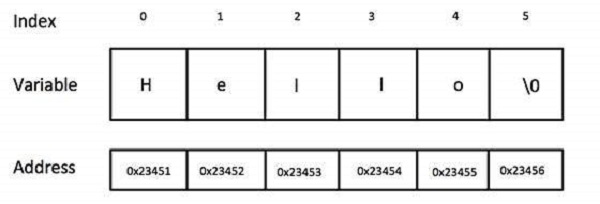Strings in C Part 2:
Finding length of the string: Counting no of chars in a string char.
#include<stdio.h>
#include<conio.h>
main()
{
char str[30];
int i;
printf("\nenter a string");
scanf("%s",str);
for(i=0;str[i]!='\0';i++);
printf("length =%d",i);
getch();
}
**Using pre-defined function.**
strlen()
à is a function
from <string.h> header file to find length of the string.
Eg:
char
str[10]=”hello”;
int len;
len=strlen(str);
Copying strings :
#include<stdio.h>
#include<conio.h>
main()
{
char str1[30],str2[30];
int i;
printf("\nenter a string");
scanf("%s",str1);
for(i=0;str1[i]!='\0';i++)
{
str2[i]=str1[i];
}
str2[i]='\0';
printf("string1 %s and string2
%s",str1,str2);
getch();
}
Using pre-defined function:
strcpy() à is pre-defined function from
<string.h> header to copy the strings. It works like an assignment
operator.
strcpy(destination, source);
Using function.
#include<stdio.h>
#include<string.h>
#include<conio.h>
main()
{
char str1[30],str2[30];
int i;
printf("\nenter a string");
scanf("%s",str1);
strcpy(str2,str1);
printf("string %s and
string2 %s",str1,str2);
getch();
}
Concatenation of two strings: It is a joining two strings.
#include<conio.h>
#include<stdio.h>
main()
{
char str1[50],str2[50],str3[100];
int i,j;
printf("\nEnter string1");
scanf("%s",str1);
printf("\nEnter string2");
scanf("%s",str2);
/* copying str1 ---> str3 */
for(i=0;str1[i]!='\0';i++)
{
str3[i]=str1[i];
}
/* appending str2 --> str3 */
for(j=0;str2[j]!='\0';j++,i++)
{
str3[i]=str2[j];
}
str3[i]='\0';
printf("string1 = %s & string2 = %s ",str1,str2);
printf("Result string = %s ",str3);
getch();
}
strcat() à it is pre-defined function to
concate the strings.
strcat(destination,
source);
strcat() function
goes to end destination string and removes null char ( ‘\0’ ) and then copies
the source string into destination string.
#include<conio.h>
#include<stdio.h>
#include<string.h>
main()
{
char str1[50],str2[50],str3[100];
int i,j;
printf("\nEnter string1");
scanf("%s",str1);
printf("\nEnter string2");
scanf("%s",str2);
/* copying str1 ---> str3 */
strcpy(str3,str1);
/* appending str2 --> str3 */
strcat( str3,str2);
printf( "The string1 = %s & The string2 = %s ",str1,str2);
printf("Result string = %s ",str3);
getch();
}
Comparison of strings: It is a comparison of values.
#include<stdio.h>
#include<conio.h>
main()
{
char str1[30],str2[30];
int i,flag=0;
printf("\nEnter string1");
scanf("%s",str1);
printf("\nEnter string2");
scanf("%s",str2);
/* comparison */
for(i=0; str1[i]!='\0'||str2[i]!='\0';i++)
{
if(
(str1[i]-str2[i])>0)
{
flag=1;
printf("\n
%s is greater than %s ",str1,str2);
break;
}
else if( (str1[i]-str2[i])<0
)
{
flag=1;
printf("\n
%s greater than %s",str2,str1);
break;
}
}
if(flag==0)
{
printf("\n both are equal");
}
getch();
}
Using pre-defined function:
strcmp()-- > to compare two strings.
int n;
n=strcmp(string1,string2);
it
returns three values
1)
0
if both strings are same.
2)
+ve
value if string1 > string2
3)
–ve
value if string1< string2
Using function comparison of strings
#include<stdio.h>
#include<conio.h>
#include<string.h>
main()
{
char str1[30],str2[30];
int n;
printf("\nEnter string1");
scanf("%s",str1);
printf("\nEnter string2");
scanf("%s",str2);
/* comparison */
n=strcmp(str1,str2);
if(n==0)
{
printf("\n both are
equal");
}
else if(n>0 )
{
printf("\n %s is
greater than %s ",str1,str2);
}
else
{
printf("\n %s is
greater than %s ",str2,str1);
}
getch();
}
#include<stdio.h>
#include<conio.h>
#include<string.h>
main()
{
char str1[30],str2[30];
int n;
printf("\nEnter string1");
scanf("%s",str1);
printf("\nEnter string2");
scanf("%s",str2);
/* comparison */
if(strcmp(str1,str2)==0)
{
printf("\n both are
equal");
}
else if(strcmp(str1,str2)>0 )
{
printf("\n %s is
greater than %s ",str1,str2);
}
else
{
printf("\n %s is
greater than %s ",str2,str1);
}
getch();
}




0 Comments